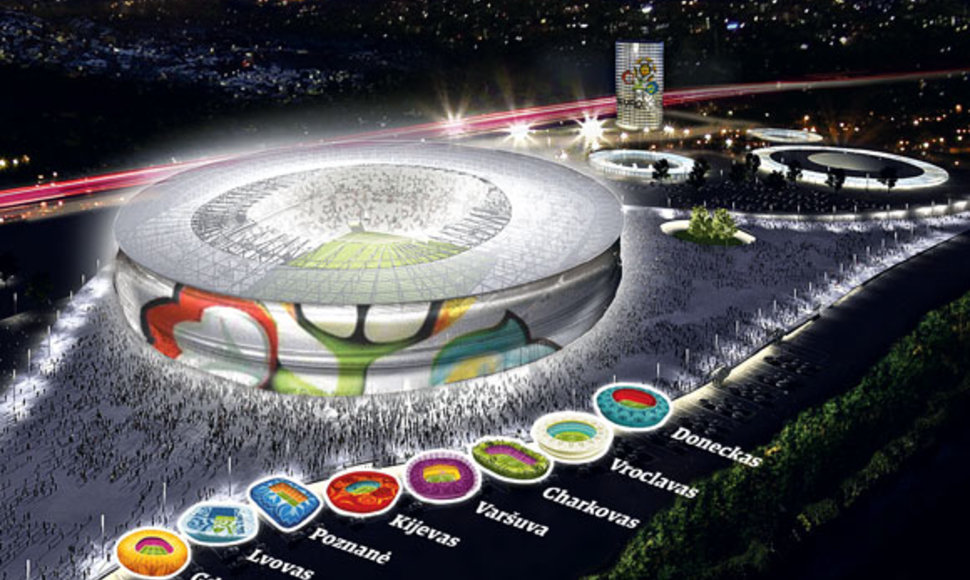Since neighbouring Poland is hardly an exotic vacation destination, we decided unanimously to go to Ukraine, thus combining two great pleasures: football and swimming in the Black sea in some Crimean backwater.
Theater begins with a cloakroom, as the saying goes, and so our Euro 2012 experience started with attempts to make heads or tails of how to get tickets – where, which games, how much?
The first two questions are readily answered in the official UEFA web page. As it turns out, if you are not a football functionary, have no fan club membership with some club, do not follow your team around the continent – in a word, if you are a simple mortal who merely wants to enjoy a good game with tens of thousands of loud-mouths, then you most go on-line and get the tickets from the same UEFA website.
Prices
The championship organizers have put ticket prices into three categories. It was announced, back in early 2011, that the prices would be set at a level affordable to the not-so-wealthy populations of the hosting countries. Sounds encouraging. If a Ukrainian can afford a night in the stadium, then certainly so does a Lithuanian.
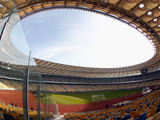 |
| „Reuters“/„Scanpix“ nuotr./Stadium in Kiev |
We discovered that cheapest seats at the opening match cost 45 euros, a little more expensive ones – 140 euros, and prime seats were 250 euros each.
Since the opening match on 8 June is to take place in Warsaw National Stadium (50,000 seats), we decided to skip it. We want to go to Ukraine. Tickets to group games that will be played 8-19 June cost 30, 70, or 120 euros.
As the teams advance further, prices go up. To get to quarterfinals (21-24 June) costs 40, 80, and 150 euros respectively. Semifinals (27-28 June) are 45, 150, and 270 euros, while the final game on 1 July is, unsurprisingly, the most expensive to get into – 50, 330, and 600 euros per seat.
Additionally, UEFA has set administrative charges for ticket buyers. For us, Lithuanians, that amounts to 20 euros, Poles and Ukrainians have to pay 10 euros and for some it is 40 euros.
So we made up our minds – we're getting cheap 30-euro seats to group games. OK, let's buy the tickets. But how?
Lottery
If you think that all it takes is to select a game and do some mouse clicks, your could not be more wrong. Football is more than a game, so after signing up on the UEFA website, one has to participate in a lottery. And that's where the fun begins.
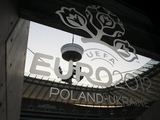 |
| „Reuters“/„Scanpix“ nuotr./Poland's National Stadium |
According to the official championship regulations, one individual can purchase no more than four tickets (for him or herself and three more guests) to one game. However, my family consists of five and none of them agrees to stay at home and watch football on TV. I did not want to be the one either, since all travel logistics lay on my shoulders. What to do?
At first, I thought I should write an angry letter to UEFA protesting the discrimination of big families. But then why waste precious time – no one would read it anyway. And if someone does, they will not change official regulations just for one family from what is a basketball nation. The problem therefore required creative solution.
When I was applying for the lottery, it was still unclear which teams would play in which groups and against whom. In effect, football fans had to rely on pure luck that the games they bought tickets to will include their favourite teams.
We picked the dates, off the cuff, and decided we wanted to see stadiums in Lvov (as it is on the way to the Black sea) and Kiev (it is the capital city, after all).
Both I and my wife signed up on the UEFA website. We filled in applications. I put myself for two tickets in Lvov and three in Kiev. My wife applied for three tickets in Lvov and two in Kiev. In total, five tickets per game.
Finally, the lottery concluded in March 2011. UEFA announced that it had received twice more
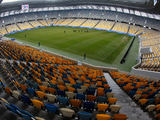 |
| „Reuters“/„Scanpix“ nuotr./Lvov stadium of 30,000 seats |
applications than there were seats available. All winners and losers were to be notified individually. My optimism about the ten tickets I'd imagined I already had began to wane.
Finally, by the end of April, I'd received two UEFA emails.
Shall I make you guess how many tickets I won? To start with, I was lucky. I got all three tickets to the Kiev arena. My wife was less fortunate. “We are sorry to inform that you did not win,” the all-mighty UEFA had spoken. And added, encouragingly, that she might try her luck in UEFA resale website that was to be launched several months later.
Lvov again
Football is more than a game. Besides being a festival, it is a multi-billion dollar business, so UEFA gave it some thought and 21-century technological ingenuity to fight ticket resellers. Only tickets purchased on the UEFA website are valid. They all have names on them. In addition to the ticket, a fan must present his or her photo ID upon entering the stadium.
Those who decided they wanted to see a different game or give up on football altogether, could sell their tickets before 2 March on the UEFA resale website that was launched last July. UEFA pledged to change the name on the ticket for a commission depending on the ticket price.
My wife had her first chance to willingly pay the commission by the end of last summer, when someone decided to ditch cheapest 30-euro tickets to the game we'd set our eyes on. Great! Even though we'll have to sit separately, at least the entire family will go to the game in Kiev.
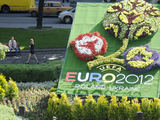 |
| AFP/„Scanpix“ nuotr./Ukraine is waiting for European football fans. |
Was it easy? One must literally hunt for tickets on the UEFA website. Check constantly for any new offers and prices. It took us several weeks to hunt down the two missing seats.
After such a turn of luck, we began pondering on Lvov again. This time, however, no blind buying – we wanted to wait until the playing teams were known. Knowing the group table would make it easier to choose the game and find the tickets.
But time was passing and during long autumn evenings, my daughter would often hint at how much she'd like to see the Germans play. I kept crushing her dreams, reminding that the Euro Cup will take place in eight different arenas, therefore chances that the German team would be coming to Lvov were meager.
And yet, when on 2 December the 16 national teams were randomly assigned into four groups, I had to admit, openly and disgracefully, that I had been wrong. Germans, along with the Dutch, Danes, and Portuguese, were assigned to group B, meeting in Kharkiv and – yes – Lvov.
The hunt
There was no more discussion at home about which game we would go to see in Lvov. That very evening I started a hunt for 30-euro tickets (very Lithuanian of me – a chance to see the game so cheaply and so close to home might not come again) to the German-Portuguese match. The hunt that would last three months.
This time, my wife was the lucky one. She paid the commission to UEFA for three tickets before the New Year. Meanwhile, I was clicking “refresh” dozens of times per day. In vain. Trade was manifestly booming on the resale website. It seemed that tickets were circulating to all other games except the one I needed. And if, every once a week or a week and a half, something would turn up, it was too pricey – I was going for 30-euro tickets.
“Surely, a German, going for a game and a beer with his chap, thinks nothing of paying 120 euros for a seat. For my pocket, 240 euros are too straining,” I fussed, clicking maniacally on the refresh button.
Expensive tickets to my game would disappear seconds after appearing on sale. The demand was high, there was no doubt, while the supply appeared measly. Especially since the Lvov stadium was among the smallest, with meager 30,000 seats. The one in Kiev contains twice as many.
One day, right after the New Year, I held my breath – I saw the tickets I needed on-line. My animation was followed by disappointment. “We cannot offer the amount of tickets you requested,” the automated response read. What the... I only need two! Someone decided to sell only one.
Another time, someone was selling more. But then the system cracked and, three minutes later, I had to wave bye bye to the tickets.
I sunk into despair. What to do? Would we have to make a draw to decide who would accompany my wife to the game? Or perhaps we might as well sell the tickets off, so no one gets hurt? They would get snapped instantly.
Finally, with only a month left till the end of reselling (early March), I resolved to buy the needed tickets for whatever price I could get. After all, it's a once-in-a-lifetime chance. And so, by the beginning of February, I got lucky and was holding five tickets to German-Portuguese match. 30 euros each.
Well, I am slightly rushing ahead. I do not hold them in my hand per se, even though I've already paid. UEFA promised to send them via snail mail about six weeks before the Euro Cup opens. I'll be waiting, even though who knows what can still turn up? For example, UEFA says it is not responsible for possible flaws in postal services.
But I have already paid for the tickets! And so, time to start looking for accommodation in Lvov.
Oh yes, that's a story in its own right. To be continued.
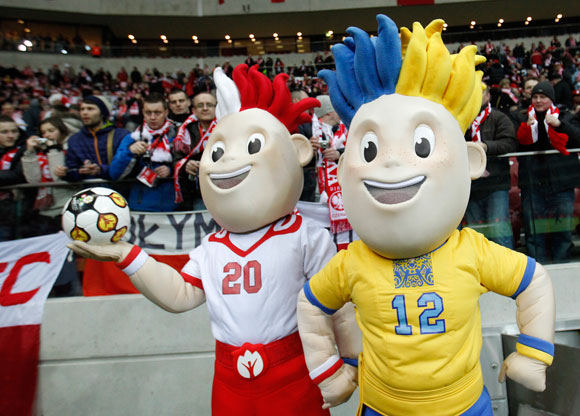 |
| „Reuters“/„Scanpix“ nuotr./Mascots of Euro 2012 |
